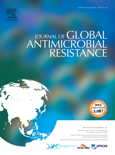
Journal of Global Antimicrobial Resistance
Scope & Guideline
Empowering research to combat resistance worldwide.
Introduction
Aims and Scopes
- Epidemiology of Antimicrobial Resistance:
Research on the prevalence and distribution of antimicrobial resistance across various pathogens, particularly in clinical settings and community health. - Mechanisms of Resistance:
Investigations into the genetic and biochemical mechanisms underlying resistance to antibiotics and other antimicrobial agents. - Therapeutic Strategies:
Studies on novel therapeutic approaches, including the use of combination therapies, phage therapy, and new antibiotic classes to combat resistant infections. - Public Health Implications:
Analysis of the impact of antimicrobial resistance on public health, including infection control measures, antimicrobial stewardship programs, and policy recommendations. - Global Surveillance and Monitoring:
Reports and studies focusing on global trends in antimicrobial resistance, including data collection and analysis from various regions. - Environmental and One Health Perspectives:
Research exploring the relationship between antimicrobial resistance in environmental contexts and its implications for human and animal health.
Trending and Emerging
- Mobile Genetic Elements:
There is a notable increase in research focusing on mobile genetic elements (e.g., plasmids, integrons) that facilitate the spread of resistance genes among bacterial populations. - Phage Therapy:
Growing interest in phage therapy as a potential alternative treatment for antibiotic-resistant infections, with several studies exploring its efficacy and practical applications. - Multidrug-Resistant Organisms:
A significant rise in studies addressing the characteristics, epidemiology, and treatment options for multidrug-resistant organisms, particularly concerning Klebsiella pneumoniae and Acinetobacter species. - Environmental Resistance Studies:
Emerging research examining the role of the environment in the dissemination of antimicrobial resistance, including studies on wastewater and agricultural runoff. - AI and Computational Models:
An increasing trend towards utilizing artificial intelligence and computational models to predict resistance patterns and optimize treatment strategies. - Combination Therapy Approaches:
Heightened focus on combination therapies, particularly those involving novel agents or repurposed drugs, as a strategy to combat resistant infections.
Declining or Waning
- Non-Bacterial Infections:
Research focusing on non-bacterial infections, such as viral or fungal pathogens, has become less prominent, possibly due to the increased focus on bacterial resistance issues. - Traditional Antibiotic Susceptibility Testing Methods:
Studies emphasizing conventional methods of susceptibility testing are waning as newer techniques, such as genomic and metagenomic approaches, gain traction. - Single-Agent Therapy Studies:
Research focused solely on single-agent therapies for resistant infections is decreasing in favor of studies exploring combination therapies or novel treatments. - Antimicrobial Resistance in Veterinary Medicine:
While still important, the frequency of studies specifically addressing antimicrobial resistance in veterinary contexts appears to be declining in the journal's recent publications. - Regional Specificity:
Papers centered on localized resistance patterns in specific countries or regions, without a broader global context, are less frequently published, signaling a shift towards more comprehensive global studies.
Similar Journals
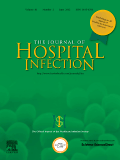
Journal of Hospital Infection
Transforming Clinical Practices Through Rigorous ResearchJournal of Hospital Infection, published by W B SAUNDERS CO LTD, stands as a pivotal resource in the infectious diseases, medicine, and microbiology sectors. With an impressive impact factor positioning it in the Q1 quartile across its relevant categories, this journal not only ranks highly—#32 out of 344 in Infectious Diseases and #17 out of 140 in Medical Microbiology—but also exemplifies a commitment to advancing knowledge and practice in hospital infection control. Since its inception in 1980, the journal has become a vital platform for disseminating research that informs clinical practices, promotes safety in health care environments, and enhances medical education. While access is non-open, the journal's extensive scope and rigorously peer-reviewed contributions ensure its relevance and significance to researchers, professionals, and students aiming to stay at the forefront of this dynamic field. The journal’s headquarters in London underscores its international relevance, making it an essential reference for anyone involved in combating hospital-acquired infections.

International Journal of Antimicrobial Agents
Shaping the Future of Antimicrobial TreatmentsInternational Journal of Antimicrobial Agents, published by Elsevier, stands as a premier platform in the fields of Infectious Diseases, Microbiology, and Medical Pharmacology. With an impressive impact factor and ranked in the Q1 category across multiple medical disciplines in 2023, this journal is recognized for its contribution to advancing knowledge and understanding in the efficacy and safety of antimicrobial treatments. Its comprehensive scope from 1991 to 2024 allows for the publishing of original research, reviews, and commentary on pressing issues related to antimicrobial resistance, treatment strategies, and pharmacological innovations. With a strong emphasis on high-quality research as reflected in its Scopus rankings, the journal is an essential resource for researchers, clinicians, and students dedicated to improving patient outcomes in the face of evolving microbiological challenges. Engage with the latest findings and methodologies through this vital academic resource, available in print and online, from the heart of the Netherlands.

Infectious Disease Reports
Disseminating vital research for a healthier global community.Infectious Disease Reports is a premier open-access journal published by MDPI, dedicated to advancing the field of infectious diseases. Since its inception in 2009, this journal has established itself as a significant platform for disseminating cutting-edge research, reviews, and case studies, critical for global health. With a commendable Q2 ranking in the category of Infectious Diseases and a Scopus rank of #140 out of 344, it is recognized for its impactful contributions to medical research, holding a 59th percentile in its field. The journal aims to provide comprehensive insights into various dimensions of infectious diseases, ranging from epidemiology to novel treatment modalities. As an open-access publication, Infectious Disease Reports ensures that its articles are freely available to a wide audience, fostering collaborative efforts among researchers, healthcare professionals, and students worldwide. With its ongoing commitment to excellence, the journal plays an essential role in shaping the future of infectious disease research.
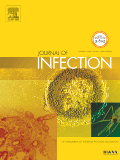
JOURNAL OF INFECTION
Cultivating Expertise in Medical MicrobiologyJOURNAL OF INFECTION is a premier academic publication in the fields of infectious diseases and medical microbiology, published by W B SAUNDERS CO LTD. With a profound impact factor and established since 1979, this journal serves as a crucial resource for researchers, clinicians, and policy-makers seeking to advance knowledge and understanding of infectious processes and their management. The JOURNAL OF INFECTION holds an impressive position in the academic hierarchy as reflected by its Q1 quartile rankings in both Infectious Diseases and Microbiology (medical) for 2023, further underscored by its Scopus rankings: #2 in Medical Microbiology and #5 in Medical Infectious Diseases, placing it in the 98th percentile overall. While the journal does not offer Open Access options, it provides a comprehensive outlet for innovative research, reviews, and clinical insights that drive the field forward. Published from the United Kingdom, it attracts a global readership keen on staying at the forefront of infectious disease research, making it an essential addition to any academic and clinical library.

Reviews and Research in Medical Microbiology
Advancing the Frontiers of Medical MicrobiologyReviews and Research in Medical Microbiology is a premier academic journal published by LIPPINCOTT WILLIAMS & WILKINS, focusing on groundbreaking research and comprehensive reviews that advance the understanding of medical microbiology. With an ISSN of 2770-3150 and an E-ISSN of 2770-3169, this journal serves as an essential resource for researchers, healthcare professionals, and students dedicated to the study of pathogens, infectious diseases, and microbial mechanisms affecting health. While the journal currently does not offer open access, its rigorous peer-review process ensures that only high-quality, impactful research is disseminated to the scientific community. The journal aims to bridge gaps in knowledge by presenting cutting-edge studies that explore novel therapeutic strategies, diagnostic methods, and the evolving landscape of microbial resistance. Nestled in the heart of Philadelphia, this journal proudly contributes to the advancement of medical microbiology and is an indispensable platform for the publication of critical findings that shape clinical practices and research trajectories in the field.
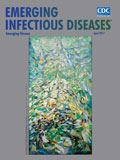
EMERGING INFECTIOUS DISEASES
Advancing the Frontlines of Infectious Disease ResearchEmerging Infectious Diseases, published by the Centers for Disease Control and Prevention, is a leading open-access journal that has been dedicated to the field of epidemiology, infectious diseases, and medical microbiology since its inception in 1995. With an impressive impact factor placing it in the Q1 quartile rankings for multiple categories including Epidemiology, Infectious Diseases, and Medical Microbiology, this journal serves as a vital resource for researchers, practitioners, and students dedicated to combating the challenges posed by emerging infectious diseases. The journal's distinguished Scopus ranks further highlight its global influence, ranking #10 in Epidemiology, #26 in Infectious Diseases, and #13 in Medical Microbiology, all within the top percentiles. Accessible and targeted, Emerging Infectious Diseases publishes seminal research and reviews that contribute to the understanding and management of infectious diseases, ensuring that critical insights reach a broad audience. The journal encourages contributions that advance the scientific community’s knowledge and responses to public health challenges.

Annals of Clinical Microbiology and Antimicrobials
Elevating scientific dialogue in microbiology and medicine.Annals of Clinical Microbiology and Antimicrobials, published by BMC, is a leading open-access journal that has been fostering scientific discourse in the fields of microbiology and infectious diseases since its inception in 2002. With an established reputation for excellence, this journal is positioned in the prestigious Q1 category across multiple disciplines, including Infectious Diseases, Medicine (miscellaneous), and Medical Microbiology as of 2023. This journal serves as a vital platform for researchers, healthcare professionals, and students, promoting the latest advancements in clinical microbiology and antimicrobial research. Access to its invaluable content is open to all, reflecting the commitment to disseminate knowledge universally. The Annals of Clinical Microbiology and Antimicrobials is based in the United Kingdom and continues to pave the way for innovation and discussions that shape the future of clinical practices in microbiology.
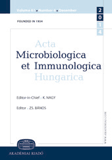
ACTA MICROBIOLOGICA ET IMMUNOLOGICA HUNGARICA
Pioneering insights into microbial challenges.ACTA MICROBIOLOGICA ET IMMUNOLOGICA HUNGARICA is a distinguished academic journal published by AKADEMIAI KIADO ZRT, focusing on significant advancements in the fields of microbiology, immunology, and infectious diseases. Established in 1994, this journal serves as a vital platform for researchers, professionals, and students keen on exploring the complexities of microbial interactions and immune responses. With a current Impact Factor reflecting its rank within the Q3 categories for Immunology, Microbiology, and Infectious Diseases, it retains a critical position in disseminating innovative research. Although not open access, the journal provides extensive insights disseminated through various academic databases, ensuring a broad reach within the scholarly community. Its convergence over three decades indicates a robust commitment to excellence in scientific inquiry and knowledge sharing. As it moves towards the future, ACTA MICROBIOLOGICA ET IMMUNOLOGICA HUNGARICA continues to uphold its legacy of fostering collaborative research initiatives that contribute to the understanding and treatment of microbial diseases globally.
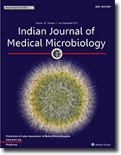
Indian Journal of Medical Microbiology
Empowering Researchers Through Accessible KnowledgeIndian Journal of Medical Microbiology, published by Elsevier, is a pivotal peer-reviewed journal dedicated to the field of medical microbiology, providing a vital platform for research and scholarship since its inception in 1986. With an Open Access model established in 2001, it ensures the dissemination of scientific knowledge to a global audience, enhancing accessibility for researchers, professionals, and students alike. The journal's scope spans critical areas including immunology, infectious diseases, and microbiology, with an impressive trajectory marked by converged years of publication allowing for a comprehensive exploration of evolving scientific trends. As of 2023, the journal holds a Q3 ranking in Infectious Diseases and Microbiology (medical) and a Q4 ranking in Immunology and Microbiology categories, reflecting its significant yet growing impact in the field. Researchers seeking to contribute to or stay updated on the latest advancements in medical microbiology will find the Indian Journal of Medical Microbiology a valuable resource, as it consistently bridges the gap between emerging science and clinical application.

Infection and Drug Resistance
Championing open access for groundbreaking research in infection control.Infection and Drug Resistance, published by DOVE MEDICAL PRESS LTD, is a leading open-access journal dedicated to the critical fields of infectious diseases and pharmacology. Since its establishment in 2008, this journal has emerged as a vital resource for researchers, professionals, and students alike, offering thorough insights into the mechanisms of drug resistance and the effectiveness of various therapeutic interventions. With an impressive 2023 impact factor placing it in the Q2 category across multiple relevant disciplines, including Infectious Diseases and Pharmacology, it serves as a significant platform for high-quality research dissemination. Infection and Drug Resistance aims to foster a deeper understanding of the evolving challenges in managing infectious diseases and enhancing drug efficacy, contributing to the global discourse on public health. The journal's commitment to open access ensures that vital knowledge is readily available to promote broader scholarly engagement and innovation.